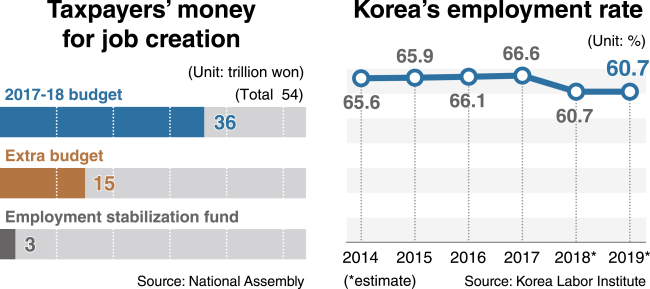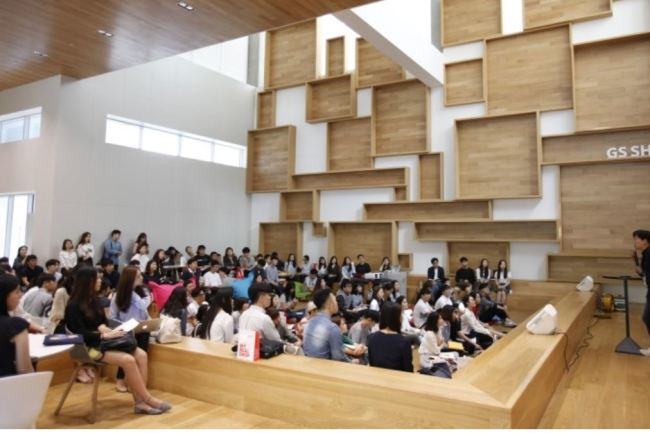SEJONG - During his 2017 presidential campaign, candidate Moon Jae-in promised to create 800,000 jobs if elected. His employment pledge is estimated to have appealed to many voters, including among the youth.
The Moon administration has reportedly poured about 54 trillion won ($48.2 billion) in taxpayer money, involving a supplementary budget and stabilization fund, into the employment-related segment over the past 20 months. But the result at the present stage falls far short of the stated goal, according to data released by Statistics Korea last December.
As of November 2018, the “extended unemployment rate” among young people -- which includes job seekers, those who have abandoned looking for jobs and workers looking for night jobs -- reached 21.6 percent, which is the highest since the authority started its estimation.
Data from the Education Ministry was similar. The employment rate of about 570,000 college graduates stood at 66.2 percent as of the end of 2017, down 1.5 percentage points from a year earlier. That figure was under 67 percent for the first time since 2011.
In addition, the total employment rate for the overall generation in 2018 is estimated to post 60.7 percent with the number of jobless people exceeding 1 million, according to Statistics Korea and Bank of Korea.

(Korea Herald)
Amid the worse-than-expected employment segment score, President Moon said in a New Year’s message to the public Wednesday that he would prioritize job creation along with justice in 2019’s administrative affairs.
He suggested innovation of the manufacturing industry as the solution for employment vitalization.
The outlook on the 2019 hiring market is also gloomy, according to a report from the Sejong-based Korea Labor Institute.
In the “Labor Market Assessment” report, the state-controlled research institute predicted the employment rate and number of unemployed will post 60.7 percent and 1.086 million this year, respectively, the same figures as the 2018 estimate.
KLI focused on the retail services sector. “Businesses such as convenience stores, food franchises and coffee shops are saturated. As long as the economic slowdown continues, it will be difficult to see employment indices growth,” said research fellow Sung Jae-min.
Further, Sung made it clear that the projection is based on the assumption that the pace of slowdown does not accelerate. He added that positive factors for better hiring conditions would be the government’s fiscal expansion and relieving self-employed retailers of their cost burden for service charges on credit card settlement.
By sector, the report predicted that the manufacturing industry is up to external uncertainties like the US-China trade conflict, and the outlook on builders is also not so bright despite increasing employment on the back of construction projects underway from the second half of 2018.

Job seekers gather in a home-shopping channel operator’s headquarters in Mullae-dong, Seoul. (GS Shop)
As a large portion of the people and small business owners complain, the statutory minimum wage is undermining the job market. Following a hike of 16.5 percent in 2018, the minimum wage has climbed 10.9 percent to 8,350 won in 2019, up 820 won on-year.
Professor Yun Chang-hyun from University of Seoul was quoted by a media outlet as saying that small business operators “withstood by reducing workforce and costs amid the hike in 16.4 percent in 2018.
“And the 10.9 percent hike in 2019 will deal a serious blow to the self-employed and small and mid-sized enterprises, under which (many of them) will close their businesses as they will face a financially critical point, apart from the labor and operation costs.”
Worsening symptoms have already been reported among retailers, restaurants and lodging businesses. Over the first 11 months of 2018, the number of monthly employed dropped by 119,000 on-year on average.
The number employed for apartment security or cleaning is also on a declining trend, falling 91,000 in November from the previous year, Statistics Korea data showed.
Online community users are comparing the use of 54 trillion won for less than two years for job creation to 22 trillion won for the four-river refurbishment project over five years during the Lee Myung-bak administration.
“The huge spending has brought creation of short-term, unstable jobs in the public sector since 2017,” an online commenter argued.
By Kim Yon-se (kys@heraldcorp.com)







